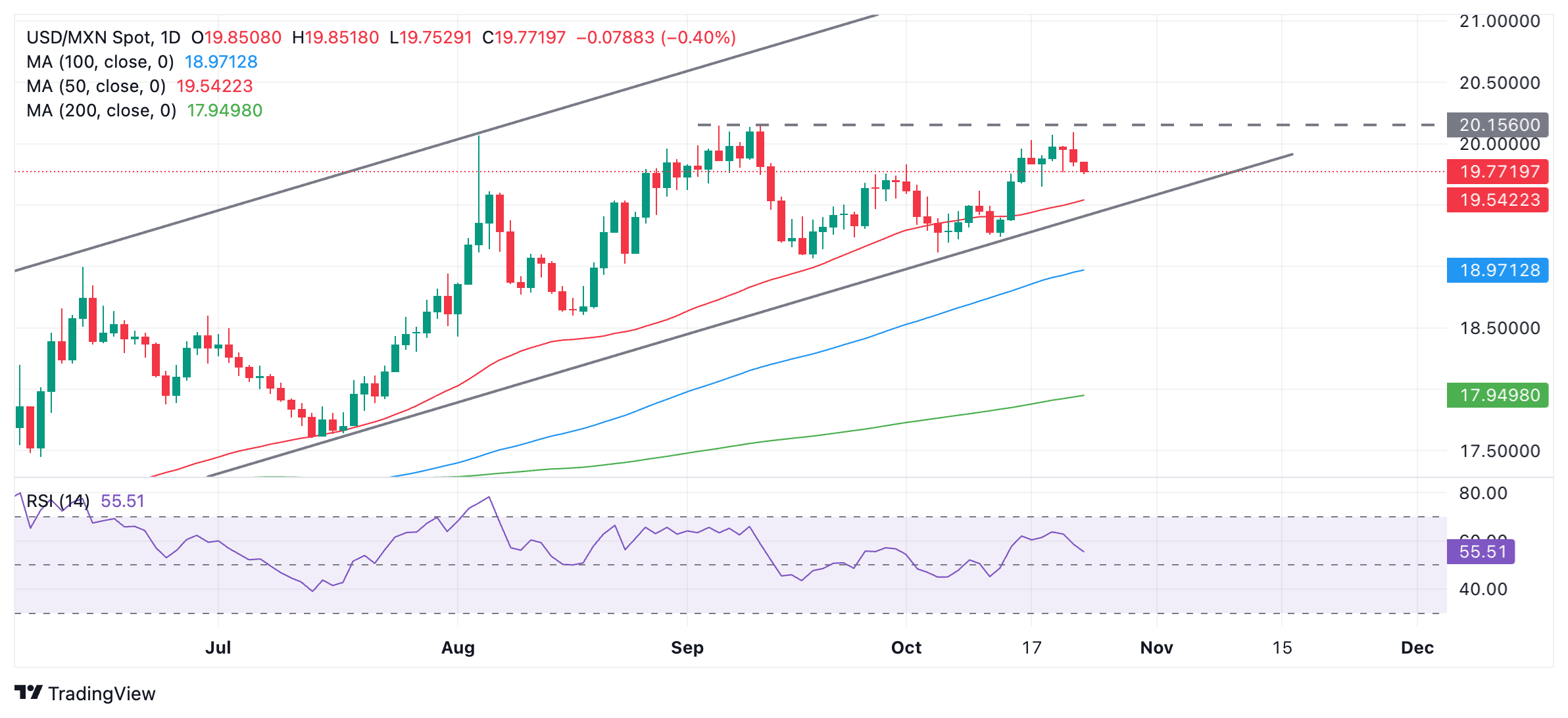Mexican Peso reverses in technical bounce and revival of carry
- The Mexican Peso executes a technical bounce and rises despite negative fundamentals.
- The move could be technically inspired or as a result of a revival in carry flows due to the weakening Yen.
- USD/MXN pulls back after testing the 20.00 hurdle. The pair remains in a broader uptrend.
The Mexican Peso (MXN) edges higher on Thursday following a reversal on Wednesday, in which it first fell to a one-month low against the US Dollar (USD) but then reversed – partly due to technical buying – and recovered by an average of about half a percent in its most heavily-traded pairs – the USD/MXN, EUR/MXN and GBP/MXN. A revival of the carry trade due to the recent depreciation in the Japanese Yen (JPY) might be a further factor in the Peso’s recovery.
Mexican Peso recovers: Potential revival of the carry trade?
The Mexican Peso executed a surprising volte face in its key pairs on Wednesday and builds on the rebound on Thursday. One possible explanation for the recovery, given MXN’s negative fundamentals, is the weakness experienced by the Japanese Yen, which could be reviving investor interest in the carry trade and, as a result, raising demand for the Peso.
The Mexican currency tends to be a key beneficiary of carry flows because of its relatively high interest rates offered to depositors in Mexico, influenced by The Bank of Mexico’s (Banxico) cash rate, which is 10.50%. This compares to only 0.25% in Japan, where interest rates are stuck at low levels due to endemic deflation.
The carry operation involves borrowing capital in a low-interest currency, such as the Japanese Yen, and using the money to buy a higher interest-paying alternative, such as the Mexican Peso. The difference between the cost of servicing the Yen-denominated loan and the interest earned on the MXN investment generates a profit (10.50% - 0.25% = 10.25%), assuming no change in the exchange rate. If the Yen weakens or the Peso strengthens, however, the carry trade becomes even more profitable.
Mexican Peso still vulnerable to bearish fundamentals
Despite possible gains from the carry flows, the Mexican Peso remains vulnerable to multiple bearish fundamental factors.
Data released this week painted a gloomy picture of the Mexican economy after both Economic Activity and Retail Sales fell sharply in August. This reinforces the negative economic outlook forecast by the IMF for Mexico in its recent reports for 2024 and 2025.
Weak growth will likely weigh on the Mexican Peso and pressure Banxico to lower interest, which would reduce foreign capital inflows.
Uncertainty over the outcome of the US election is a further negative factor for the Peso now that former President Donald Trump has bounced back after falling behind in the polls. Trump has said he will use tariffs to limit foreign imports, particularly of Mexican-made cars, which would be negative for the Peso. According to election website FiveThirtyEight.com, the latest poll held by Forbes on October 21-22 put Trump one point ahead on 49%, versus Vice President Kamala Harris’s 48%.
Technical Analysis: USD/MXN pulls back but momentum remains with bulls
USD/MXN is pulling back after flirting with the 20.00 level. However, it overall remains in an uptrend within a rising channel, which, given the technical dictum “the trend is your friend,” is eventually likely to resume and push the price to higher highs.
USD/MXN Daily Chart
The Relative Strength Index (RSI) indicator in the daily chart remains relatively elevated, signaling momentum remains bullish. At the moment, this further supports the view that the pullback will only be a temporary stumbling block for the uptrend before it resumes its upside bias.
The break above 19.83 (October 1 high) has confirmed a probable move up to the next target in the vicinity of the September 10 high at 20.13.
Economic Indicator
Retail Sales (YoY)
The Retail Sales released by INEGI measures the total receipts of retail stores. Monthly percent changes reflect the rate of changes of such sales. Changes in retail sales are widely followed as an indicator of consumer spending. Generally speaking, a high reading is seen as positive or bullish for the Mexican peso, while a low reading is seen as negative or bearish.
Read more.

